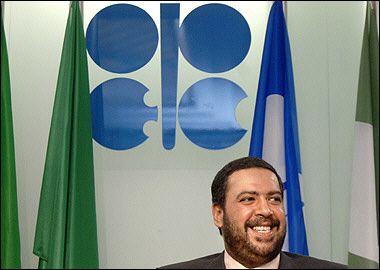|
China, OPEC start energy dialogue
(AFP)
Updated: 2005-12-23 08:56
China and the Organization of Petroleum Exporting
Countries ( OPEC) started an energy dialogue aimed at ensuring a steady supply
for one of the fastest growing economies, officials said.

Organization of
Petroleum Exporting Countries president Sheikh Ahmad Fahd al-Sabah, seen
here in September 2005. China and OPEC started an energy dialogue aimed at
ensuring a steady supply for the world's fastest growing energy user,
officials said. [AFP] |
OPEC president Sheikh Ahmad Fahd al-Sabah, who is also Kuwait's energy
minister, met Chinese Vice Premier Zeng Peiyuan and Mai Kai, head of China's key
economic planning body, the National Development and Reform Commission.
In a joint statement, Beijing and OPEC said they had established a future
cooperation framework and exchanged views on energy issues -- "in particular,
the security of supply and demand, in order to enhance market stability."
"China's economic growth requires secure, steady supplies of energy, while
OPEC's crude oil reserves and production are expected to continue growing,
ensuring that there will be enough oil to meet rising world demand for decades
to come," the statement said.
OPEC -- which groups Saudi Arabia, Iran, Venezuela, Kuwait, the United Arab
Emirates, Iraq, Nigeria, Libya, Indonesia, Algeria and Qatar -- now faces
stronger competition than ever in China from non-OPEC suppliers.
Kazakhstan last week launched a new 806-million-dollar oil pipeline to China.
China has also been pressing Russia, its largest non-OPEC supplier, to work
toward an early agreement on a oil pipeline from Siberian oil fields to China.
Russia delivered 5.8 million tons of crude by rail to China last year, and
that amount is set to reach 8.0 million tons this year.
Asked about his view on the competition, Sheikh Ahmad said the purpose of the
dialogue with China was not to increase OPEC's market share in China, but to
secure supply and to provide an environment for stable oil prices.
"We're not looking for a bigger market but we're looking for cooperation
(between) OPEC and consumers to secure the supply," he told reporters.
"We're happy that China has good relations with Russia and Kazakhstan ... to
be their main suppliers for their demand."
"We believe, as OPEC, we'll do our best to make reasonable prices, but the
main goal for us is to secure the supply for the demand, now and in the future.
"We believe OPEC, non-OPEC, even the consumers and the international oil
companies should work together to secure the supply and jointly to invest in the
downstream to raise the capacity ... which is very important for (making) the
prices more stable."
Before he left for Beijing, he had said the group's first talks with China,
the world's second-largest oil consumer, would focus on China's future demand.
"We want to know ... China's future requirements for energy and its
investments in refineries and refining capacity," Sheikh Ahmad had said.
Sheikh Ahmad also said earlier he would complete negotiations in China that
began in Kuwait two weeks ago for the construction of a five-billion-dollar
refining and petrochemicals complex in southern Guangdong province.
On December 5, the two countries signed a memorandum of understanding for the
project that includes building a refinery with a capacity of between 200,000 and
400,000 barrels per day.
|